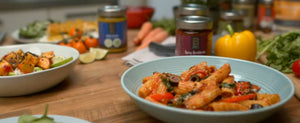
This interview is with Haley Brown, author of the popular blog ‘Low Fodmapper’ and creator of a new Low FODMAP eBook.
Suffering with digestive issues? Following a low FODMAP diet? Then read on to find out what happened to Haley and how she eventually found the help she needed…
Tell us a little bit about you...
I’m Haley – an HR professional by day and Low FODMAP blogger by night! I’m originally from Canada but my travels have led me all around the world. I am extremely passionate about traveling, the outdoors, trying new foods and learning about different cultures.
Over the past few years, I have traveled to over 30 countries, living and working in 4. I recently spent a year and a half working in a Japanese ski resort, and have now settled in the UK with my partner.
What digestive condition do you suffer with? When did it start? Was it easy to get diagnosed?
I suffer with IBS-D and SIBO. In 2014, I contracted a bacterial infection in Thailand and did not receive medical treatment until a few weeks later. When I did seek treatment, the infection had already spread to other parts of my body. This led to me taking large doses of antibiotics to rid myself of the infection.
I wasn’t educated on the impact of antibiotic abuse, and unfortunately continued to undergo further antibiotic treatment after I returned to Canada. I had never suffered with gastrointestinal issues up until my return back to Canada, so I am fairly certain that the combination of the infection and the over-use of antibiotics had a huge impact on my gut bacteria, which would later develop into IBS-D and SIBO.
My symptoms were so severe for the next two years and ended up severely impacted my quality of life (especially with regards to my professional life, my mental health and my passion for traveling). I had absolutely no control over my symptoms and unfortunately, they left me feeling anxious and unable to cope with even the simplest of daily tasks.
My doctor in Canada told me that I “likely had IBS” and that there was no cure (even though I had never experienced these symptoms for the first 22 years of my life). It wasn’t until I had private medical insurance through my employer in the UK that I was referred to a gastroenterologist who would later have me tested for SIBO (which came back positive). I was also referred to a dietician who was able to guide me through the first stages of the Low FODMAP diet.
How long have you been following a Low FODMAP Diet for? How did you hear about it?
Unfortunately, when I first sought help in Canada, the Low FODMAP diet was not yet medically accepted. Never once had anyone recommended dietary intervention for my symptoms.
In 2016, my gastroenterologist in the UK suggested that I follow a Low FODMAP diet and referred me to a dietician who was able to guide me through the initial stages. I followed the elimination stage for quite some time (longer than the recommended 4-6 weeks) as it did provide me with symptom relief, and unfortunately, my symptoms were still awful any time I tried to re-introduce High FODMAP foods (especially beets, avocado, onion, garlic for example).
I also started a probiotic regime which seemed to help. After about 2 years of following the diet, I have now transitioned to a modified diet in which I eat intuitively and try to incorporate FODMAPs into my diet (in small amounts) where I feel comfortable doing so. While I still experience symptoms daily, they are nowhere near as debilitating as they used to be, and I am no longer afraid of eating High FODMAP foods (remember, it is the Low FODMAP diet, not the No FODMAP diet).
What do you find the most challenging when explaining the Low FODMAP Diet to others?
That the Low FODMAP Diet is not a “one size fits all” solution, and unfortunately, it takes a ton of trial and error to find out what works for you personally. This was extremely difficult for me to accept when I was first prescribed the diet, as I assumed that if I followed it stringently, I would experience complete relief.
The reality is that there are a ton of non-dietary factors, and non-FODMAP foods that were adding to my symptoms (alcohol, stress, mental health), and unfortunately following the Low FODMAP diet alone was not enough in my personal case.
What do you find hardest about following a Low FODMAP diet?
Traveling, and eating in restaurants! While I travel all the time, eating abroad used to cause me a great deal of anxiety. Even if I was lucky enough to find a Low FODMAP meal abroad, I almost always experienced symptoms, which was really difficult for me to accept. I have come to learn that I am very sensitive to food contamination (I can’t even count the number of times I have had food poisoning while abroad).
To anyone who has just been diagnosed with IBS or a similar digestive condition, what advice would you give them?
My best advice would be to seek help from a variety of professionals (not just your GP), as many are not able to diagnose gastrointestinal disorders. I would also recommend seeing a dietician to guide you through any drastic dietary changes to ensure you are still eating a nutritionally balanced diet.
Never be embarrassed or afraid to reach out about your struggles. After I started my blog, I was SO surprised to hear how many people close to me were suffering with similar symptoms.. it’s just not something you walk up to a friend and tell them about, but fortunately, I believe the conversation has opened up drastically over the years. Even if you do not feel comfortable talking to those around you, there are so many groups online (Instagram, Facebook and Pinterest) that offer advice, support, and guidance for people with gastro issues.
What myth you would like to clear up about FODMAPs?
That all FODMAPs are bad! FODMAPs provide essential prebiotics that act as food for our gut flora, hence why the Low FODMAP is not a “forever” diet. Unfortunately, they just act as a trigger for people with existing gut issues, but it’s likely that not all FODMAPs will act as triggers for you personally. That’s why it’s important to follow the diet alongside a registered dietician who will help you to identify your food triggers so that you aren’t unnecessarily cutting out any foods.
Why did you decide to start writing your blog?
When I was prescribed a Low FODMAP diet, there were not a ton of resources online for people on the diet. I was given a list of acceptable foods from my dietician, and that’s pretty much it. I immediately had to start cooking all of my meals at home, and spent so much time creating new recipes and adapting my favourite existing recipes to be Low FODMAP.
I realized this was something I really enjoyed – I’ve always been a creative, and found that I could easily apply that nature to cooking. I started sharing my recipes and photos on Instagram, and couldn’t believe the response. I was mostly documenting them for my own “diary” if you will, but then I realized I could help to inspire others along the way.
You have recently launched an eBook – what’s it all about?
I wanted to create a Low FODMAP resource for people that was affordable, approachable and relatable. I’m not a registered dietician, nor am I a professional cook in any form (so it’s important to note the eBook does not contain any medical advice).
Regardless, I know that people value realistic, easy, healthy and unique FODMAP friendly recipes that can be easily cooked from home. This is something that I missed when I was first prescribed a Low FODMAP diet – a lot of the recipes I found were meat-heavy and left me feeling that I would be eating bland/plain foods throughout the process.
I also wanted to show that you can easily eat vegan/vegetarian on a Low FODMAP diet, and it doesn’t need to be boring. The Beginner’s Guide to the Low FODMAP Diet contains 50+ plant based Low FODMAP recipes/meal ideas, a comprehensive list of High/Low FODMAP foods and a range of “flavour hacks” to replicate the taste of onion/garlic.
We really hope you enjoyed our interview with Haley, and found her story relatable and picked up some great tips.
Here you can find links to Haley’s new eBook, as well as her website and social channels.
eBook: www.lowfodmapper.com
Instagram: @lowfodmapper
Website: lowfodmapper.com
Pinterest: @lowfodmapper
Facebook: Low Fodmapper
Interviewed by Bay Burdett, Founder & CEO of Bay’s Kitchen.
Copyright Bay’s Kitchen. Please do not reprint without permission.
Related Articles
How To Restore Balance & Rejuvenate Your Gut Health
Introducing Nutrition & Health Specialists: Uniquely Created U
6 Relaxation Techniques To Ease Your IBS Symptoms
Popup
Use this popup to embed a mailing list sign up form. Alternatively use it as a simple call to action with a link to a product or a page.
Age verification
By clicking enter you are verifying that you are old enough to consume alcohol.




